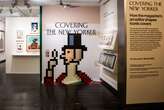Hello and welcome to Modern CEO! I’m Stephanie Mehta, CEO and chief content officer of Mansueto Ventures. Each week this newsletter explores inclusive approaches to leadership drawn from conversations with executives and entrepreneurs, and from the pages of Inc. and Fast Company. If you received this newsletter from a friend, you can sign up to get it yourself every Monday morning.
Consumers will spend a whopping $27.5 billion on Valentine’s Day this year, up from $25.8 billion last year, according to the National Retail Federation.
For 1-800-Flowers.com, the purveyor of candy, cards, and—yes—flowers, February 14 is a bit like its Super Bowl, with year-long planning for the holiday.
Beyond bouquets
Founder, chairman, and CEO Jim McCann, who started the business in 1976 when he acquired a flower shop in Manhattan, says Valentine’s Day has expanded from an observance of romantic love to an opportunity to give gifts to friends, loved ones, and even pets. Historically, men made up 90% of purchasers during the holiday. “We now see men making up less than 70% of our customers who purchase for Valentine’s Day, and the recipient has broadened beyond the sweetheart to moms and sisters and children,” McCann says. “That’s resulted, frankly, in it becoming a bigger holiday for us.”
The retailer has responded in kind, introducing pet-themed items (pet owners are expected to spend $2 billion on Valentine’s Day) and a collaboration with lifestyle brand LoveShackFancy featuring pastel-hued cookies and flowers suitable for “Galentine’s Day” celebrations of female friendship. The company also offers trending items such as black roses, designed to appeal to Gen Z. In all, the company says it will deliver 24 million flowers for Valentine’s Day.
Fixing make-or-break tech
When I asked McCann how he leads his organization through demand surges, I expected him to talk about supply chain, marketing campaigns, and staffing. Instead, he openly spoke about the company’s work to correct problems caused by the implementation of a new order management system at the company’s Harry & David fruit and prepared foods unit during the December holiday season. The system had trouble managing some complex orders, which caused delivery delays, frustrated customers, and some canceled orders. Though his seasoned team has deep experience in the business, “sometimes mistakes happen,” McCann says. Flower delivery and other units such as Shari’s Berries and The Popcorn Factory don’t use the same system, but they share a common customer service platform that was overwhelmed by the holiday season snafu.
On a recent earnings call, 1-800-Flowers.com executives said many of the issues with the order system have been resolved. “We can hopefully come out a better management company as a result of it, because we cannot escape the changes of technology that are upon us and coming ever faster,” McCann tells me.
Embracing the flops
McCann’s willingness to own up to mistakes is nothing new. He frequently writes about mistakes he’s made in his career and even maintains a “Wall of Shame” at company headquarters “dedicated to celebrating every stumble, flop, and facepalm moment our team has had over the years,” he says.
Of course, leaders and companies have to do more than just own up to their errors—they have to learn from them and figure out how to take calculated or mitigated risks. Harvard Business School professor Amy Edmonson writes about “intelligent failure” in her book Right Kind of Wrong: The Science of Failing Well. She contends that “failing well” is necessary if companies ever expect to break new ground.
McCann’s unabashed embrace of his own failures is a stark contrast to many other founders, who swagger about with an air of infallibility. (For more on these imperious folks, check out Inc. editor-at-large Bill Saporito’s story on “The cult of the entrepreneur.”) Indeed, when I asked McCann if 1-800-Flowers.com benefitted from having a founder as CEO, he demurred.
“There are other people who are better at managing, and there are things that I could do that they can’t do because of the unique situation I’m in, having lived and breathed [this business] my whole adult life and having such a passion for it,” he says. “I don’t think I’m the best CEO that’s ever lived. I think I’m pretty good at envisioning what we are and what we can be.”
What’s your biggest ‘my bad’ moment?
Do you have a wall of shame at your company? What was your biggest failure, and what did you learn from it? Send your comments to me at [email protected]. I’d like to share some of your insights in an upcoming newsletter dedicated to failure.
Read more: on failing
- The Silicon Valley man obsessed with failure
- The biggest business failures of 2024
- 3 successful designers on the lessons of failure








No comments